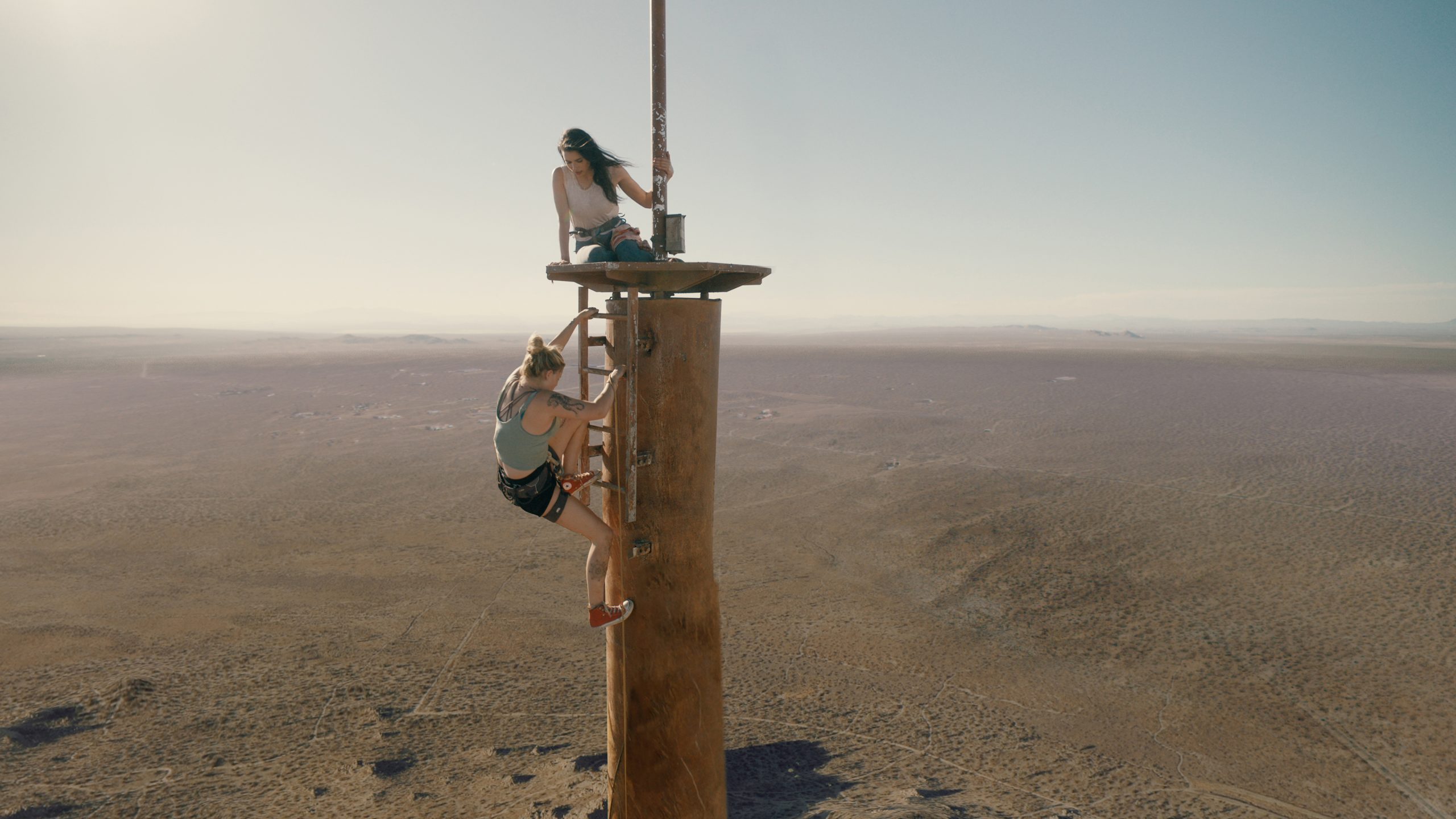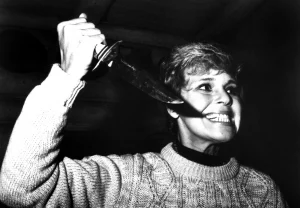Fall (2022)
Fear reaches new heights.
A high-concept survival thriller, Fall largely succeeds due to its tight premise, exciting edge-of-your-seat set pieces, and a great lead performance from star Grace Caroline Currey, Shazam! (2019). The film is genuinely more frightening than recent franchise horror pictures — think last year’s middling The Conjuring: The Devil Made Me Do It. I actually suffer from acrophobia (fear of heights), so certain parts of Fall legitimately scared the daylights out of me. Directed and co-written by British filmmaker Scott Mann, Heist (2015), Fall uses survival horror movies such as Open Water (2003), and 47 Meters Down (2017) as inspiration — the latter sharing producers on this feature. But instead of using shark infested waters, Mann takes terror to the sky, turning to a 2,000-foot tall, decommissioned television tower in the remote desert to leave our heroines stranded on. Abandoned in isolated, female protagonists Becky and Hunter must use their wits to fight against time, the natural elements, and a series of daunting obstacles in their desperate attempt to climb back down.
The story opens with adrenaline junkies/ BFFs Becky Connor (Grace Caroline Currey) and Shiloh Hunter (Virginia Gardner) free climbing a steep mountain rockface with Becky’s husband, Dan (Mason Gooding). Tragedy strikes while Dan is attempting to secure a spring-loaded camming device inside a small cave; he loses his footing because of a bird, then tragically falls to his death due to harness failure, despite both Becky and Hunter’s best efforts at trying to save him. It’s a painful life-altering experience for Becky, who drowns herself in a sea of anguish for the next 51 weeks.
A year later, Becky has become a withdrawn, self-destructive alcoholic, and has estranged herself from her father, James (Jeffrey Dean Morgan), and friend Hunter. The situation becomes so bad that Becky even contemplates suicide; she attempts to overdose on prescription medication until she’s interrupted by Hunter, who, without warning, arrives at Becky’s doorstep with a proposal. Hunter wants Becky to accompany her to scale an abandoned 2,000-foot B67 TV tower out in the middle of the Mojave desert (the supposed fourth tallest tower in the United States). Hunter hopes that this adventure will snap the emotionally fragile Becky out of her depression and re-spark her risk-taker side (Becky hasn’t climbed since the ill-fated accident). Hunter believes that the experience will be healthy for Becky, convincing the ex-climber to use it to confront her personal demons and move on — it’s been exactly a year since her husband’s untimely death. Although initially having cold feet, Becky eventually agrees, seeing the thrill-seeking stunt as a way to reconnect with her former friend. Becky also wishes to spread the ashes of her late husband, which she currently still holds, from the top of the tower.
The next morning, the women make the six-hour trip to the soaring structure, where Becky learns what Hunter’s been up to this past year. Since the girls last spoke, Hunter has launched, and now operates a successful YouTube account under the alias ‘Danger D,’ recording her reckless ventures then streaming them to her legion of online followers. Hunter plans on doing the same on this insane climb, documenting the whole experience then uploading it to her channel. Once the pair reach their destination — a rusty weather-beaten edifice, complete with rattling rivets and vertigo-inspiring construction — the women begin their slow ascension. Of course, things don’t go to plan, and the climb becomes peril laden. When Becky and Hunter finally reach the top, they find themselves stranded on a narrow platform — the corroded and rickety old ladder they climbed has collapsed — with no cellphone reception and very little food and supplies; so, things are looking down. Now, the women must muster up every ounce of courage and strength to devise a plan for a safe return to the ground, having to overcome a series of overwhelming challenges — natural, physical, and emotional.
Penned by filmmaker Mann and his regular co-writer Jonathan Frank, Fall stretches realism to breaking point; one must really suspend disbelief to enjoy parts of this film. Literally everything that can go wrong for the protagonists does — the women contend with ravenous circling vultures; there’s a convenient drone blunder, and some unnecessary melodrama to create conflict between the characters while stranded sky high. Still, the anxiety level dread fashioned by the filmmaking team is frightfully effecting, even if you’re mildly uneasy with heights; Mann and co. have generated some excellent moments of heart-pounding tension and adrenaline-charged suspense, taking full advantage of the film’s simple yet effective premise. Sure, there are a handful of predictable narrative beats — I saw most of the twists coming — and unneeded personal drama to pad out the run time (Fall is almost two hours long when it should have been a short, sharp 90 minutes), but for what it’s worth, the film succeeds at keeping viewers entertained, anxious, and enthralled, clutching the armrests of their seats. The movie also explores themes of loss, confronting trauma, living life to the fullest, the power of friendship, and facing one’s fears — not that I want to face my fear of heights anytime soon, especially not after sitting through this!
For a relatively small-budgeted picture, Fall looks excellent. Mann’s direction is great; he employs a series of crafty techniques, such as overhead drone footage, vertiginous angles, and a series of aerial shots to make the remote location unnerving while single handedly heightening the sense of isolation, fear, and the women’s’ weariness and desperation. This is further aided by the top-notch camerawork of Spanish cinematographer Miguel Olaso (credited under the pseudonym MacGregor), who has photographed imagery that enhances the story and suspense; certain moments of the movie are so effective that they may cause legitimate dizziness, or have viewers feeling light-headed. MacGregor also makes the most of the harsh natural beauty of the secluded desert setting, as well as showcasing the sheer awe of the stunning white mountain faces in the film’s prologue. There is, however, a decent amount of CGI and green screen employed throughout, but these elements work surprisingly well, and have been incorporated into the live action material almost seamlessly.
Fall is essentially a two hander, with climbing enthusiasts Becky and Hunter carrying the entire feature. Grace Caroline Currey gives a particularly strong central performance as the grief-stricken Becky, who exhibits a range of emotions — pain, heartache, fear, solitude, determination, anger, and even denial. Caroline Currey also sells the physical beats of the role. She comes across as an authentic extreme sports enthusiast but shows off her softer, more vulnerable side in the quieter scenes. Her camaraderie with co-star Virginia Gardner, Project Almanac (2015), is also credible, even if Gardener’s act comes off a slightly more unconvincing — she nails the bubbly, happy-go-lucky adventure-seeker side of the character better than the horror and drama aspects. Nevertheless, the women bounce off each other nicely and create a credible buddy dynamic. Jeffrey Dean Morgan also shows up as Becky’s concerned father James, who is desperately wanting his daughter to move on with her life, The Walking Dead (2016-22) star bringing gravitas to the film in his brief scene.
If films like the Oscar winning 2018 documentary Free Solo — in which Fall’s opener is reminiscent of — tested your tolerance for heights, Fall may push you over the edge. That said, Scott Mann’s has crafted a confident feature that’s nerve-shredding and enthralling, albeit a smidge clichéd and overlong, Fall boasting some solid performances and first-rate visuals. Fortunately, Mann’s film is so representative of what real-life climbing would be like that we’ll never need to scale up a 2,000-foot tower for an adrenaline rush — not that this was ever on my bucket list.
3.5 / 5 – Great
Reviewed by Stu Cachia (S-Littner)



